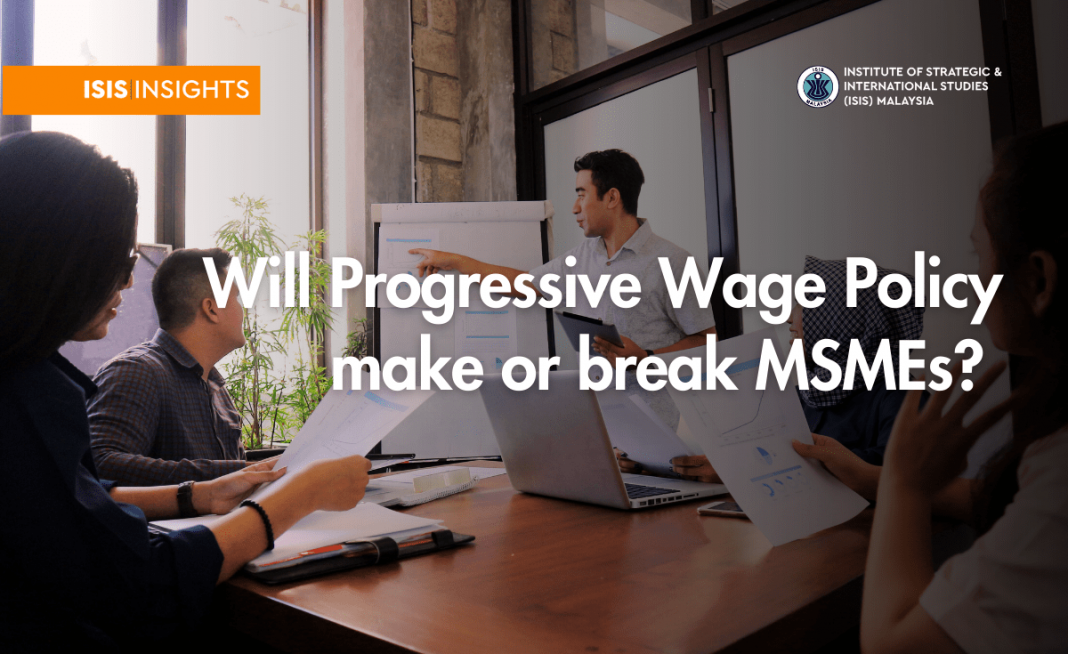Move to increase quality, productivity requires industry wide participation
The Progressive Wage Policy (PWP) appears tailored for micro, small and medium enterprises (MSMEs), excluding multinational and government-linked companies.
The policy’s incentive-based, voluntary and non-punitive nature aims to reward workers through productivity gains rather than mandating a higher wage floor for MSMEs. It tries to strike a balance, ensuring that businesses avoid bearing higher costs without a commensurate increase in productivity.
Malaysia’s MSMEs face longstanding issues in labour productivity, a reality reflected in national statistics. For instance, MSMEs contribute 34% of manufacturing GDP while employing 48% of sector employees.
Collectively, while MSMEs contribute 38.4% to GDP, they employ 75% of non-public workers. This disparity is intricately correlated to the difficulties MSMEs face attracting and retaining skill-intensive workers, despite 40.2% of students graduating in STEM fields.
According to the 2022 Global Innovation Index, while Malaysia ranked third in science and technology graduates, it ranked 62nd for knowledge-based labour productivity and 63rd for creativity-based service exports, indicating a mismatch between talent and productivity. Many MSMEs also struggle with low margins and cash constraints, with 29% reporting less than two months of reserves.
Thus, PWP offers a timely and promising solution that bridges the gap between higher productivity and wages, aligning skills with business demands and market opportunities.
Opportunities for MSMEs
PWP might prompt MSMEs, which often operate more horizontally than large firms, to embark on organisational restructuring. The focus on skill development could lead to employees being categorised along specialised skillsets and competencies, creating clear advancement pathways and structured job roles that could define the skills needed to innovate.
Crucially, according to a 2019 survey from the Human Resources Development Fund (HRDF), only 46.1% of MSME employers organised regular training. Meanwhile, 11.7% of approved trainings went towards “quality and productivity”, indicating a deficit in internal upskilling. Thus, PWP may encourage firms to reevaluate their training needs to support investments into productive skillsets.
A PWP “star system” is also interesting as it could incentivise skilled workers and graduates to gravitate towards high-scoring MSMEs, serving as markers for sustained long-term skill and career progression. This could kick-start a virtuous cycle, positioning MSMEs to attract higher-skilled talent.
Research on Singapore’s PWP supports this assessment, showing that companies in covered sectors (cleaning and security) saw tangible improvements in worker skillsets and productivity. Workers from other fields also migrated to the covered sectors because of the higher wages.
Likewise, the proposed one-off annual subsidy of RM200-RM300 per month per worker might offset the costs associated with wage increments for MSMEs.
Questions about efficacy
But doubts remain whether the one-off annual stipend could foster longer-term wage growth, especially for cash-strapped MSMEs. The voluntary nature of PWP could affect its participation rate, too.
To kick-start a virtuous cycle of enhanced wages on an industry-wide scale, a critical mass of participants is required. Should adoption remain low, a longer-term, institutionalised approach should be considered to transition gradually wages to reflect sector-specific, value-added skillsets.
Moreover, PWP’s direct impact on retail and sales-driven sectors is also ambiguous. Many roles within these sectors remunerate based on commissions, making them cyclical and susceptible to seasonal or irregular demand fluctuations. Consequently, assessing wage progression for workers with seasonal characteristics could pose challenges, highlighting the importance of nuances when determining wage ladders.
Besides this, moral hazards exist, such as when firms leverage on cash transfers while neglecting their obligations to provide sustained wage growth and career progression when the financial assistance ends. The auditing and monitoring process is, therefore, essential, ensuring that firms uphold PWP’s spirit.
Lastly, MSMEs often possess limited administrative capacity and lower management scores. While PWP does not specify micro-level productivity assessments, it could introduce a layer of administrative complexity, especially as documents must undergo government audits. Hence, the question is whether PWP will support MSMEs struggling with compliance or add red tape to our smallest firms.
Ultimately, MSMEs stand at a critical juncture while policymakers are tasked with reshaping their productive landscape amid global economic uncertainty. While PWP holds promise of upgrading the potential of MSMEs, its success depends on the collective commitment of the government and industry groups maximising the participation of all.





